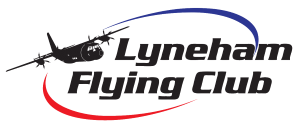Flying Training at Lyneham Flying Club
Lyneham Flying Club offers a wide range of flying training recognised by the CAA and EASA. Details of the courses we offer can be found below. Their respective prices can be found on the Course Prices page.
Private Pilot Licence (PPL)
We have several instructors on our books who can teach the syllabus for both National PPL and EASA PPL. The main differences between the 2 types are that with an NPPL you cannot progress onto commercial training or fly outside UK airspace. The advantage with the NPPL is that the medical requirement is more relaxed and the amount of training is reduced which, depending on a student's progress, might make the flying costs less.
Night Rating
The night rating consists of a minimum of 5 hours flying, of which at least 3 hours must be dual including at least 1 hour dual navigation of at least 50km. The trainee pilot must also carry out 5 full stop landings solo.
Qualified Service Pilots Aeroplanes (QMP(A)) who have completed the above may have the qualification awarded by submitting logbook evidence to the CAA. QMP Helicopters (QMP(H)), must complete the above listed hours in fixed wing aeroplanes to be awarded the qualification.
IR(R) Rating
The UK CAA IMC rating has been superseded by the EASA IR(R) Rating. This can be completed at Lyneham Flying Club. We have fewer IMC instructors and therefore availability can be limited.
Class Rating Revalidation/Renewal
Class Rating Revalidations & Renewals are completed regularly at Lyneham Flying Club. A dedicated page has been created to outline the distinction between the two and what is required to meet the criteria for both. Click here to go to the page.
- Please ensure you have a current EASA Class 1 or Class 2 Medical Certificate.
PPL & IMC Ground Exams
Ground exams can be sat at Lyneham Flying Club. Exams are charged at £20 per paper; £10 of which is chargeable to the club, with a £15 re-sit fee.
ELCAS candidates will only be charged £10 per exam chargeable to the club. Please contact your instructor for more information regarding sitting exams and having them marked.
Qualified Service Pilot (QMP) to PPL
Lyneham Flying Club can carry out all of the flying training and testing requirements to qualify a Combat Ready Qualified Service Pilot (Aeroplanes) - CR QMP(A) who is in current flying practice. This entails approx 1.5 hours of refresher training on single engine piston, all 9 EASA PPL exams and a flight test (excluding the navigation element). It is recommended that a QMP carries out approximately 1.5 hours of refresher training in a single engine piston aircraft prior to taking the test (as indicated above).
- Please ensure you have a current EASA Class 1 or Class 2 Medical Certificate.
The National Private Pilots Licence (NPPL) is also available using similar training, but the medical requirements are less stringent. All that is required is a declaration from your GP that you would be suitable for the issue of a HGV licence.
AOPA Basic and Standard Aerobatic Certificate
The Basic Aerobatics Certificate Course is a prerequsite to starting the standard aerobatics course
The Basic Aerobatic Course consists of 8 hours of ground training, 8 hours of flying training and an end of course test (in addition to the 8 hours flying).
The pilot will be tested in Theoretical Knowledge, Pre-Flight Procedures, Slow Flight, Stalling & Recovery, Recovery from Unusual Attitudes, Max Rate Turns, Spins & Recovery, Loops, Aileron Rolls, Barrel Rolls, Slow Rolls, Stall Turns, Roll Off The Top(of a loop), Half Cuban (rolling on the down line) and Combination Sequence.
Pilots with Aerobatic Experience may be exempt from some or all of the training and are only required to take the end of course test.
In order to fly aerobatics solo, any organisation will ask for AOPA Proof of Completion (or equivalent) competence in Aerobatics. Lyneham Flying Club is registered with AOPA as an Aerobatic Training Organisation.
- Several of our instructors are registered to teach the AOPA basic and standard aerobatics courses.
For further details please contact the club or browse the links below.
The following books are recommended by AOPA for the courses;
- "Basic Aerobatics", Campbell and Tempest, ISBN 1853101087
- "Aerobatics Principles and Practice", David Robson, ISBN 9781843360810
Formation Training
Formation flying requires a high degree of skill, sound planning, concentration & discipline; it improves airmanship and requires smooth accurate handling.
During the course the student will learn the essential skills of station keeping, joining formation, formation departures and recoveries, and formation leading.
Variable Pitch Propeller
In order to fly an aircraft with a Variable Pitch Propeller, the CAA require that pilots undergo 'Differences Training'.
This training can be done at Lyneham Flying Club on the available aircraft with variable pitch propellers.
The training involved to fly a variable pitch propeller aircraft starts with the pilot. The pilot must read about how a variable pitch propeller works generically and then specifically in the Pilots' Notes for the aircraft in question.
A briefing will be completed followed by a flight, usually one, operated while ensuring all aspects required are covered.
- The aspects required are shown on the Differences Training Form for VP Prop.

